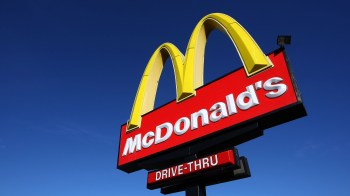
McDonald’s sales slipped. That may mean lower-income consumers feel pinched.
McDonald’s sales slipped. That may mean lower-income consumers feel pinched.

This is a busy week for corporate quarterly reports. We’ll be hearing from Microsoft, Procter & Gamble, Meta, Exxon Mobil and a bunch of other big companies. Monday, McDonald’s got the week started.
With a bit of a downer. Mickey D’s reported that its second-quarter “comparable sales” — comparing the sales of McDonald’s outlets in one time period to their sales in another — fell by 1% globally from the same time last year. On its earnings call, the company said that customers “continue to be more intentional with the dollars they spend.”
Americans eat out a lot. That means a downturn in spending at restaurants can be a warning for other industries, according to Michael Halen, a senior restaurant and food service analyst at Bloomberg Intelligence.
“Restaurants are a canary in the coal mine,” Halen said. “Typically, you know, you see a slowdown in consumer discretionary spending in restaurants before you see it in other places.”
Halen said people who earn $45,000 or less annually account for about a third of visits to McDonald’s and other fast-food chains. Right now, they are cutting back.
“They’re stretched, and they’re concerned about their job prospects. And so, they are spending less,” Halen said.
Halen said while the rate of inflation is going down, consumers are dealing with the cumulative effect of prices that have been rising for years.
“There’s no catalyst here to expect the low-income consumer spending to all of a sudden turn around,” he said.
While consumers eating out less would typically be a caution sign for the economy, Ryan Sweet, chief U.S. economist with Oxford Economics, said you have to remember that this economic cycle is different.
“We’re coming out of a pandemic, where things were locked down for a period of time. Then there was a big surge in demand for eating out because people just weren’t able to during the teeth of the pandemic,” Sweet said. “So, we could be seeing some, a little bit of a hangover effect when it comes to dining out.”
There is a “glass half-full” take on the McDonald’s sales decline. Lonnie Golden, an economics professor at Penn State Abington, pointed out that over the past year, wages have been growing faster than prices.
And lower-income people who’ve had raises may be skipping fast food because “they can afford slightly higher-end types of takeout food,” Golden said.
Think Chipotle, Panera and other fast-casual spots.
There’s a lot happening in the world. Through it all, Marketplace is here for you.
You rely on Marketplace to break down the world’s events and tell you how it affects you in a fact-based, approachable way. We rely on your financial support to keep making that possible.
Your donation today powers the independent journalism that you rely on. For just $5/month, you can help sustain Marketplace so we can keep reporting on the things that matter to you.

















